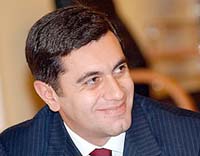Georgian Okruashvili renews allegations against President Saakashvili

A former Georgian defense minister said Tuesday that he had been forced to take back his accusations against President Mikhail Saakashvili and had renewed the claims.
Irakli Okruashvili, who called himself a "political refugee," made the remarks from Munich, Germany, according to private TV channel Imedi, which broadcast the speech live onto a big screen at a demonstration outside parliament Monday night.
Thousands of protesters who have been calling for Saakashvili's resignation in street protests since last week watched the address. Okruashvili's initial accusations against the president, including an alleged plot to murder a prominent businessman, helped ignite the protests and plunging the country into political turmoil.
Okruashvili, a former Saakashvili ally who was dismissed as defense chief last year, was arrested after making the claims in September. He told the crowd he was forced to retract the accusations while in custody. He was later freed on multimillion-dollar bail.
"All the accusations that I made toward Saakashvili before my arrest are the truth," Okruashvili said. "I apologize for the statements I was forced to make while under arrest, for the fact that I had to retract my words and in doing so failed to live up to the hopes of many."
He did not say how he was forced to make the retraction.
A day after his arrest, thousands of supporters of a newly united opposition rallied. Daily protests outside parliament since Friday pose the biggest challenge to Saakashvili since his landslide election after the Rose Revolution four years ago.
Okruashvili, known for bellicose language when he was defense minister, called Saakashvili a "modern Hitler" and urged Georgians to "unite to get rid of the black calamity that is Saakashvili." He called himself a "political refugee" but said he would not seek asylum abroad and hopes to return to Georgia soon.
The protests are taking place in the same area as the massive 2003 demonstrations known as the Rose Revolution, which prompted the resignation of longtime leader Eduard Shevardnadze and ushered Saakashvili to power.
Many of Saakashvili's opponents support the aims with which he came to power, such as courting closer ties with the United States and Europe. The president has also sought to decrease Russia's influence on the small, economically struggling Caucasus Mountain nation and to establish central government control over two separatist regions that have run their own affairs with Russian support since wars in the early 1990s.
But his critics accuse Saakashvili of increasingly authoritarian rule. Protesters initially demanded he annul a decision to move next year's parliamentary elections back by several months and reform the electoral system, but now they are also calling for his resignation.
Friday's protest drew more than 50,000 people, and somewhat smaller crowds have turned up every day since, with several demonstrators remaining overnight. The size of the crowd reached about 20,000 on Monday.
Saakashvili has rejected their demands, saying the parliamentary elections would be held as planned and that - far from stepping down - he would run for a second term in a presidential vote expected in late 2008. He suggested Russia was fomenting the unrest.
Members of the dominant political party loyal to Saakashvili denounced Okruashvili's remarks as a ploy by Badri Patarkatsishvili, a prominent businessman they claim is behind the protests, to keep up pressure on the president.
"Patarkatsishvili understands that the number of protesters is decreasing and is looking for ways to keep people at the demonstration. He has turned to special effects in the form of Okruashvili," said lawmaker Givi Targamadze.
In September, Okruashvili said that Saakashvili in 2005 tried to encourage him to kill Patarkatsishvili.
Subscribe to Pravda.Ru Telegram channel, Facebook, RSS!


